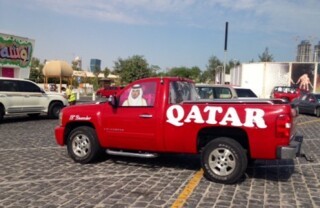In Doha
Ursula Lindsey
There was a bride in full wedding regalia on my plane from Cairo to Doha last month. She was wearing a sequinned, lacy hijab and a long, tight mermaid skirt that flared at the bottom, over a wire hoop. It wasn’t easy to manoeuvre the hoop down the aisle of the plane. She was travelling alone, and in the long empty hallways of Doha’s new airport made laborious progress. I didn’t see who came to meet her.
When I told friends in Cairo I was going to Doha, they looked shocked or worried. Until very recently, the Egyptian media and government have accused Qatar of being a state sponsor of terrorism (it supported the Muslim Brotherhood). Now the two countries are supposed to be mending ties. To mollify the Saudis (who have bankrolled Egypt’s counter-revolution), Qatar agreed to expel a few senior Muslim Brothers. They now live in Turkey, but still come to Doha to see their families. Qatar also closed an Egyptian affiliate of the al-Jazeera satellite station that was virulently anti-coup.
On the Pearl, a man-made residential island with a marina and a Ferrari dealership, I met an Egyptian friend who moved to Qatar in 2013. She defended the Brotherhood during their year in power, which lost her most of her friends. When she called Morsi’s ouster a coup, she began receiving threatening phone calls. She now works for al-Jazeera, and says she can’t go back to Egypt as long as Sisi is in power.
Politics is strangely absent from daily life and conversation in Qatar. The media empires headquartered in Doha focus their attention beyond the country’s borders. The workings of the ruling family are opaque. What is visible, and astounding, is the rate of the capital’s physical transformation. I hadn’t been for almost two years. The whole city is a building site, making room for its nine new World Cup stadiums, new hotels, new museums, who knows what else. My GPS was confounded, constantly showing me wandering in the desert, telling me it was ‘recalculating’.
On 18 December, National Day, the Corniche was shut down, as the new emir, his father and thousands of spectators took in a military parade. Jets flew overhead. There would be fireworks later. National Day is not a longstanding tradition: it was created in 2007, but has proved extremely popular. With its focus on nostalgia and military might, it seems designed to assuage the anxieties of a minority of extremely wealthy citizens in a tiny country undergoing rapid change.
The celebrations for National Day started days before, at newly built replicas of traditional spaces: a refurbished souq, a ‘cultural village’. The activities on display – horse-riding, sword-dancing, pearl-diving – have been pushed, in one generation, into the realm of folklore by the emirate’s hydrocarbon wealth. There were little boys wearing military uniforms and little girls in colourful ‘traditional’ dress. Land Rovers and Lexuses drove around painted in the colours of the flag, with portraits of the emir and his family stenciled on the windows, young men waving giant flags from the sun roofs. The traffic jams lasted all night.
At the parade itself, South Asian men, part of the migrant labour force that has built the country – hundreds die every year – came as early as 5 in the morning to get a seat, but were turned away.

Comments